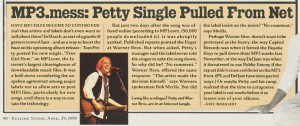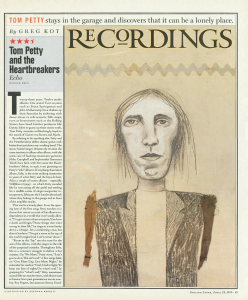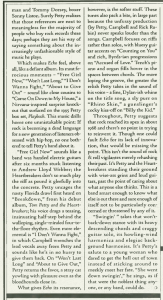MP3.mess: Petty Single Pulled From Net
By Eric Boehlert
Rolling Stone #811 - April 29, 1999
Have MP3 files become so controversial that artists and labels don't even want to talk about them? In March, as sort of a goodwill gesture toward fans -- and as a way to boost the buzz on his upcoming album release -- Tom Petty posted his new single, "Free Girl Now," on MP3.com, the Internet's largest clearinghouse of downloadable music files. It was a bold move considering the unspoken agreement among major labels not to allow acts to post MP3 files, particularly for new songs, until there is a way to contain the technology.
But just two days after the song was offered online (according to MP3.com, 150,000 people downloaded it), it was abruptly yanked. Published reports pointed the finger at Warner Bros. But when asked, Petty's manager said the label never told the singer to take the song down. So why did he? "No comment." Warner Bros. offered the same response. "The artist made the decision himself," says Warners spokesman Bob Merlis. But did the label insist on the move? "No comment," says Merlis.
Perhaps Warner Bros. doesn't want to be portrayed as the heavy, the way Capitol Records was when it forced the Beastie Boys to pull down their MP3 tracks last November, or the way Def Jam was when it threatened to sue Public Enemy if the rap act didn't cease and desist on the MP3 front. (PE and Def Jam have since parted ways). Or maybe Petty and his camp realized that the time to antagonize your label is not weeks before it releases one of your albums.
Recordings
By Greg Kot
Rolling Stone #811 - April 29, 1999
★★★ ½ | Tom Petty and the Heartbreakers | Echo (Warner Bros)
Tom Petty stays in the garage and discovers that it can be a lonely place.
Twenty-three years. Twelve studio albums. One sound. Even as peers such as Bruce Springsteen and John Mellencamp have shaken up their formulas by tinkering with dance mixes and solo acoustic folk songs, even as forerunners as the Rolling Stones have hired hotshot producers like Danny Sabre to gussy up their recent work, Tom Petty remains unflinchingly loyal to the sound of Sixties-era Stones and Byrds.
By refusing to do anything else, Petty and the Heartbreakers define classic guitar rock better than just about any working band. The straw-haired singer obsessively revisits the same territory in album after album, with the same cast of backing musicians; guitarist Mike Campbell and keyboardist Benmont Tench have been with him since the Heartbreakers' debut, in 1976, even guessing on Petty's "solo" albums. If anything, their latest album, Echo, is the most striking reassertion in years of what Petty and the boys do best. After a couple of recent albums -- especially Wildflowers (1994) -- on which Petty sounded like he was easing off the pedal and settling for a midlife career of singer-songwriter introspection, Echo puts the Heartbreakers back where they belong: in the garage and in front of the amplifier stacks.
That can be a lonely place. From the opening bars of the first song, Petty touches on a theme that recurs on most of his albums: independence in a world that won't easily allow it. "I've got a room where everyone/Can have a drink and forget/Those things that went wrong in their life," he sings in a tone barely above a whisper. It's a comforting voice, but then it hardens: "I've got a room at the top of the world tonight/And I ain't comin' down."
"Room at the Top" sets the tone for the rest of the album, with the singer in the role of the perpetual outsider. Throughout Echo, life is a constant struggle to define what matters. On "No More," Petty vows, "I ain't gonna do it/If it ain't real." A few songs later, on "One More Day, One More Night," he reiterates his resolve: "God, I had to fight/To keep my line of sight/On what's real." In grasping for "what's real," Petty sometimes sounds like an anachronism, with shout-outs to heroes from past generations: movie cowboy Roy Rogers, late jazzmen Benny Goodman and Tommy Dorsey, boxer Sonny Liston. Surely Petty realizes that those references are next to meaningless for the majority of people who buy rock records these days; perhaps they are his way of saying something about the increasingly unfashionable style of music he plays.
Which makes Echo feel, above all, like a defiant album. Its most ferocious moments -- "Free Girl Now," "Won't Last Long," "I Don't Wanna Fight," "About To Give Out" -- sound like close cousins to "Come On Down to My House," a Nirvana-inspired surprised knockout that surfaced on the 1995 Petty box set, Playback. This music drills home one unmistakable point: If rock is becoming a dead language for a new generation of listeners obsessed with hip-hop, no one bothered to tell Petty's band about it.
"Free Girl Now" sounds like a band was handed electric guitars after six months stuck listening to Andrew Lloyd Webber; the Heartbreakers don't so much play the riff as pound it gleefully into the concrete. Petty uncages the nasty Florida drawl first heard on "Breakdown," from his debut album, Tom Petty and the Heartbreakers; his voice drags a teasing, insinuating half-step behind the walloping, single-minded four-to-the-floor rhythm. Even more elemental is "I Don't Wanna Fight," in which Campbell wrenches the lead vocals away from Petty and sounds like he's in no hurry to give them back. On "Won't Last Long" and "About to Give Out," Petty returns the favor, a stray cat yowling with pleasure even as the bloodhounds close in.
What gives Echo its resonance, however, is the softer stuff. These tunes also pack a bite, in large part because the unfussy production (by Petty, Campbell and Rick Rubin) never speaks louder than the songs. Campbell focuses on riffs rather than solos, with bluesy guitar accents on "Counting on You" and rich, Byrds-ian progressions on "Accused of Love." Tench's piano and organ fills hover in the spaces between chords. The more loping the groove, the greater the relish Petty takes in the sound of his voice -- a fine, Dylan-ish whine on the title song, a sly purr on "Rhino Skin," a gunslinger's cocky kiss-off on "Billy The Kid."
Throughout, Petty suggests that rock reached hits apex in about 1968 and there's no point in trying to reinvent it. Though out could fault Echo for its lack of innovation, that would be missing the point. This isn't the sound of rock & roll vigilantes merely rehashing their past. It's Petty and the Heartbreakers standing their ground with wide-ass grins and loud guitars, past the point of caring about what anyone else thinks. This is a band smart enough to know what else is out there and sure enough of itself not to be particularly concerned or threatened by any of it.
"Swingin'" takes that won't-back-down stance with its heavy descending chords and craggy guitar solo, its howling-wind harmonica and elegiac background harmonies. It's Petty's salute to a young woman who dared to get the hell out of town instead of sticking around to meekly meet her fate. "She went down swingin'," he sings, as if that were the noblest thing anyone, or any band, could do.



